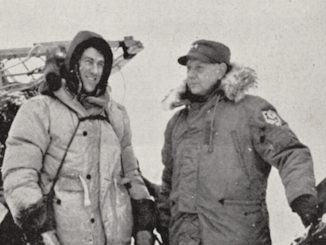18 August 1944
Ten minutes ago the shock-headed young signalman came swaying across the signals deck and grinned at me. He made a noise like a dive-bomber and his hands mimed an Focke-Wulf Fw 190 peeling off.
I gathered that with reasonable luck we may be attacked shortly. According to the radio we have been “tailed” for the last hour.
Above us the first pale stars wheel dizzily round the masthead. The sun has gone down in flames, and the blue Mediterranean suddenly is grey, cold, mysterious.
Behind, as the ships of this convoy are closing in, looking for all the world like a huddle of anxious old ladies waiting for the policeman’s signal to cross a busy street.
If anything happens at all it will happen now — at dusk — when every froth of foam could be a periscope surfacing. Don’t tell me you can’t have mirages at sea.
Serious Business
The tousle-haired young signalman grabs an armful of “washing” from the signals locker and clips them to a halyard. They go fluttering gaily to the masthead… Behind us the old ladies clutch at their skirts and go scampering into their new positions.
And the Sultan (that isn’t her real name, but it must serve) settles down to the serious business of the night.
The Sultan is a brand-new 1944-model destroyer, American built, with the cradle marks still on her. Perhaps she isn’t the old-time destroyer man’s ideal. He would find her, no doubt, too full of gadgets. For the Sultan is full of tricky little gadgets. Soundproof telephone “booths” in the engine room; automatic “black-outs” that switch off lights below decks when a door is opened. The British Naval liaison officer calls her “a real Lease-Lend job.” And so she is — right down to the silverware in the wardroom and the US. Navy “wind-breakers” the gun crews are wearing.
Somewhere behind me a loud-speaker bawls, “Action Stations!” And you suddenly realise that all this is really a piece of Fighting France — as truly French as the Tricolour cracking at the masthead.
From Prison Camps
They are drawn from every town, every Department of France, the crew of the Sultan. There are men who have not seen France — except as a blue smudge on the horizon — since before Dunkirk. There are men who made their way to her from prison camps. There are some who saw their ships go down in the holocaust of Toulon.

Grim and proud,
Unknown photographer – © Newspapers.com, reproduced with permission
High up in the sound hut sits a youngster listening to what sounds like the perpetual squeaking of rusty hinges. Last night he was very excited. His instruments had picked up a new squeak. It was an echo from the French coast. Over there to the north, far below the horizon, is his home.
The capitain d’armes has just been round inspecting, quietly efficient. He is leather-faced, his eyes a sea-washed blue. There is a tattooed anchor on his wrist. In another uniform he might be a typical Chief Petty Officer from Plymouth. But he comes from Morbihan, where in happier days the artists used to cluster under their umbrellas and try to capture the play of sunlight on drying nets.
He prefers not to talk about Morbihan.
A steward comes hand-over-hand around the deck and tells me that the captain would like me to take a glass of wine with him. The captain has been on the bridge since early morning. He looks tired and his eyes are red-rimmed.
“I’m sorry you have had such a dull trip,” he says. “I thought, perhaps, this time just one U-boat.” He shrugs his shoulders eloquently. “You must come again.”
Borrowed Weapons
He is an aristocrat, this captain. You can see it in his fine, slender hands, in the slightly imperious beaked nose. He is a Norman. His home lies in what today is “No Man’s Land.” So we don’t talk about Normandy. We talk about the French Navy instead.
“Once, you know, we had a very fine navy.” He sighs, and he might be talking of something that happened a hundred years ago. “You see how keen my crew is? How they long to get into action? That isn’t bravado, my friend. That is just a natural instinct — how do you say? — to rehabilitate themselves.
I compliment him on his ship. “Yes,” he says, “she is a fine ship. But she isn’t French, you know.” I know what he means. It is not quite the same thing — to fight with borrowed weapons.
His crew understand, too. They are proud of their brand-new ship. They admire the modern equipment, the comfort, the magnificent weapons. But they cling to their old faded uniform caps. They sew their old brass buttons on their American overalls. For every button is a bit of France.
English as “Brum”
Someone else on board the Sultan understands, too. And he is English — as English as Birmingham, where he was born. Coder Tony Drakeford is 19. He is one of the small English “colony” on board. He has been “lent” by the Royal Navy. And for ten months he has done turn-and-turn-about with the French signals team.
He has shared their “casse-croute” (a sandwich of sardine or cheese) when they come off watch together. He has drawn has daily ration of red wine. And he has joined in their games of belote (which makes pontoon seem as innocent as ludo, he tells me). And in return they share his “char,” and call him “Gingair,” and swap language lessons.
Says Drakeford: “Did you ever hear why the French sailor wears a red ‘pom-pom’ on his cap? Well, the book-of-words will tell you that it’s a survival of the old days, when the French matelots wore stocking hats, like the pirates in the ‘Pirates of Penzance.’ But you will never get a French Navyman to admit that. No. The pom-pom was awarded to the French Navy by Napoleon, because it had proved itself the finest fleet on the seas.”
As we left base we passed an old French destroyer. She was slow and sea-worn.
Our modern masterpiece slid away from her without an effort. But two grizzled matelots leaning over the rail and watching her saw something else. Said one to the other, “Francaise, ca mon vieux.” The other said nothing, but his eyes gave the answer.
It’s little things like that which go to make a Navy.
This article first appeared in the Manchester Evening News in August 1944 – Jerry F
Reproduced with permission
© 2024 Newspapers.com
Jerry F 2024



